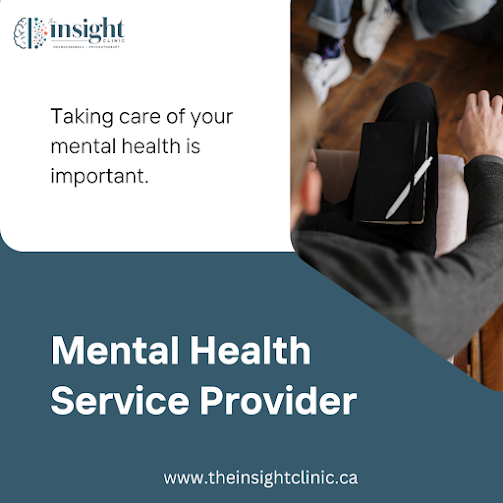Understanding the Different Types of Anxiety Treatment.
Anxiety is a common human feeling that impacts millions of people worldwide. While some anxiety is normal, chronic and severe anxiety can cause major disruptions to everyday activities. Luckily, there are a number of therapies available to assist people in controlling and overcoming anxiety. In this blog, we'll explore the different types of anxiety treatments, shedding light on the diverse approaches available for those seeking relief, including specific considerations for Anxiety Treatment in Ontario.
Breaking the Stigma: Importance of Seeking Treatment
Anxiety treatment is not just about addressing symptoms; it's also about breaking societal stigmas surrounding mental health. Acknowledging the importance of seeking treatment can be the first step towards a healthier, more balanced life. We'll delve into the impact of societal attitudes, encouraging individuals to prioritize their mental well-being without fear or judgment.
Medication: Navigating the Pros and Cons
For many, medication plays a crucial role in anxiety treatment. From selective serotonin reuptake inhibitors (SSRIs) to benzodiazepines, understanding the types of medications available and their pros and cons is essential. We'll navigate through the pharmaceutical landscape, offering insights into how medications can effectively alleviate anxiety symptoms while addressing potential drawbacks.
Unraveling the Power of Psychotherapy
Psychotherapy, often referred to as talk therapy, is a cornerstone in anxiety treatment. Cognitive-Behavioral Therapy (CBT), exposure therapy, and other therapeutic approaches can empower individuals to understand and manage their anxiety. Let's explore the transformative potential of psychotherapy and its role in providing coping mechanisms for life's challenges.
Lifestyle Changes: Building a Foundation for Anxiety Management
Beyond pharmaceuticals and therapy, simple lifestyle changes can significantly impact anxiety levels. Regular exercise, a balanced diet, and quality sleep are not just good practices for physical health but are integral components of effective anxiety management. We'll discuss how these lifestyle adjustments contribute to a holistic approach in treating anxiety.
Alternative Therapies: Exploring Holistic Approaches
In recent years, alternative and complementary therapies have gained popularity for their holistic approach to mental health. Practices like yoga, meditation, acupuncture, and herbal supplements offer diverse paths to anxiety relief. Join us as we explore these alternative avenues, understanding how they contribute to a comprehensive treatment plan.
Integrative Treatment Plans: The Synergy of Medication and Therapy
For some, the most effective approach involves combining medication and therapy. Integrative treatment plans recognize the synergy between pharmaceuticals and psychotherapy, providing a comprehensive strategy for managing anxiety. We'll discuss how this dual-pronged approach addresses symptoms from multiple angles, fostering a more balanced mental state.
Personal Stories: Triumphs Over Anxiety
Real-life testimonials offer a beacon of hope for those grappling with anxiety. In this section, we'll share inspiring stories of individuals who have successfully navigated their anxiety treatment journey. These personal narratives not only provide encouragement but also demonstrate that recovery is possible.
Challenges in the Treatment Process: Finding the Right Path
While seeking treatment is a positive step, the journey is not without challenges. From finding the right treatment to dealing with potential side effects, we'll address the obstacles individuals may encounter. Understanding and overcoming these challenges are pivotal in ensuring a smoother path to anxiety recovery.
Supporting a Loved One: Tips for Compassionate Assistance
If someone you care about is undergoing anxiety treatment, providing support is invaluable. This section offers insights into understanding their experience and providing the emotional support they need. Nurturing an environment of empathy and encouragement can make a significant difference in their journey.
The Role of Self-Care: A Personalized Approach to Well-Being
Self-care is not a luxury; it's a necessity, especially for those managing anxiety. We'll explore the significance of self-care practices in maintaining mental well-being, offering practical tips on incorporating self-care into daily life. From mindfulness to setting boundaries, personalized self-care can be a transformative tool.
Overcoming Obstacles: Addressing Stigma and Financial Barriers
Stigma and financial constraints often act as barriers to seeking anxiety treatment. This section provides strategies for addressing societal stigma and explores potential solutions for overcoming financial barriers. Everyone deserves access to mental health care, and breaking down these obstacles is essential for a more inclusive approach to anxiety treatment.
Ongoing Support: Navigating the Long-Term Journey
Anxiety is often a chronic condition, requiring long-term strategies for ongoing support. We'll discuss the importance of continuous care, prevention of relapses, and maintaining mental well-being beyond the initial treatment phase. Navigating the long-term journey involves adapting and evolving strategies for sustained mental health.
Research and Innovations: Paving the Way Forward
The field of anxiety treatment is dynamic, with ongoing research and innovations shaping the future. We'll explore emerging therapies and current studies that provide a glimpse into the evolving landscape of anxiety treatment. Staying informed about these developments can offer hope and potential avenues for those seeking progressive approaches.
Recognizing When Adjustments Are Needed: Signs of Ineffectiveness
As with any medical treatment, it's essential to recognize when adjustments are necessary. This section outlines signs that indicate the potential ineffectiveness of current treatment approaches. Being proactive in identifying these signs allows for timely adjustments, ensuring a more responsive and tailored treatment plan.
Conclusion: Navigating the Path to Anxiety Recovery
Understanding the different types of anxiety treatment is a vital step in the journey to recovery. Whether through medication, psychotherapy, lifestyle changes, or alternative therapies, there are diverse paths available. Seeking treatment is an act of self-compassion, and with the right support from a mental health service provider, individuals can navigate the path to anxiety recovery and lead fulfilling lives.
FAQ Section
Q1. How long does it typically take for anxiety treatment to show results?
A1. The timeframe for seeing results varies for each individual. Some may experience improvements within weeks, while others may take longer. It's essential to communicate regularly with your healthcare provider to monitor progress.
Q2. Can lifestyle changes alone effectively manage anxiety?
A2. Lifestyle changes, including exercise, diet, and sleep, can significantly contribute to anxiety management. However, for many individuals, a combination of lifestyle adjustments and other treatment modalities may be more effective.
Q3. Are there natural remedies that can help with anxiety?
A3. Certain natural remedies, such as herbal supplements and practices like yoga and meditation, have shown promise in managing anxiety. However, it's crucial to consult with a healthcare professional before incorporating these into your treatment plan.
Q4. How can I support a loved one going through anxiety treatment?
A4. Providing understanding, patience, and emotional support is key. Educate yourself about your loved one's experience, and encourage open communication. Additionally, offer to accompany them to appointments or engage in activities that promote relaxation and well-being.
Q5. What can be done to address the financial barriers to anxiety treatment?
A5. Financial barriers can be challenging, but there are resources available. Explore community mental health services, non-profit organizations, and government assistance programs. Some therapists offer sliding-scale fees based on income. Don't hesitate to discuss financial concerns with your healthcare provider to explore available options.
.png)



Comments
Post a Comment